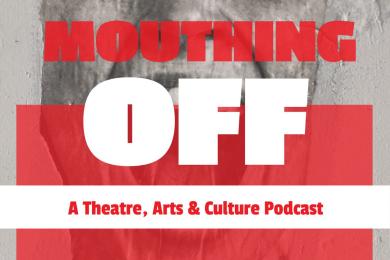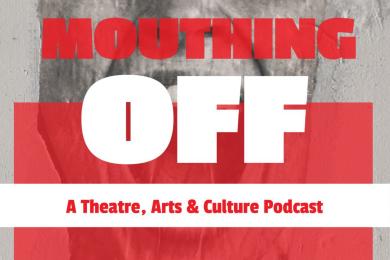It only tells you TO think
Richard, you are the director of “Hair: the American Tribal Love-Rock Musical” which will be the inaugural production of a new company called Theatre 55. Hair opens on January 31st and runs through February 10th. The show is being performed at Mixed Blood Theatre. Where can folks go to reserve tickets?
Tickets are available through http://theatre55.org or from brownpapertickets.com
We continue to celebrate the 50th anniversary of Hair. There have been been a bunch of revivals and there is apparently going to be a “Hair Live” this Spring on NBC. But your production is unique because it’s “Hair -- Performed by Those Who Lived It!” Can you talk a little about that approach and how it shapes the production?
Because of Theatre 55’s mission, and the 50th anniversary of Hair, it was selected as our inaugural production. The themes of the show are as relevant today as they were 50 years ago. We’re still fighting for basic human rights in this country and Hair was a monumental theatrical experience at a pivotal time in American History and it remains relevant today. This production, performed by people 50+ years old, means that most people remember the time, the feeling, and the importance of the Hippie movement and how it changed our country. I am asking the actors selected to play their own ages, not 20 year olds. This has had a very pronounced impact on the production. It means that the people performing it have both experienced the time first hand and are not doing it for the sheer shock factor, but rather for the revolutionary spirit of the musical. These actors are still fighting to leave the world a better place. And as you get older, the less time there is to make the world a better place. These actors not only lived the experience, but still believe it and still want to tell it, as part of their own history and lives.
The plot of Hair is a kind of Bildungsroman, revolving around the character of Claude, who is trying, in the lingo of the time, “to find himself”. He’s also been drafted and he is torn about whether to serve.. And in his search for an answer as well as for fulfillment, he joins the hippies in Central Park. It is a play that’s gone through quite a few revisions and it has evolved over time. The authors James Rado and Jerome Ragni (Galt MacDermot wrote the music) came out of the New York experimental theater. They first started writing what would become Hair in 1964, before there even were hippies. As the writers met and interacted with figures from the sixties counterculture, the play became more about the hippies - the youth movement that was around between, roughly ,1965 and 1969. And like the characters of the play, the hippies were mostly in their late teens or early twenties: they were young people who had rejected the values and ambitions and expectations that they perceived in middle class society: conformity, materialism, religious conservatism and the goal of achieving the American dream. They wanted something different. And they were part of the coalition that made up the anti-war movement. Can you speak to us a little more about the decision you describe above - having actors who are 55-79 performing a play that is about a historical youth movement and playing their own ages? And what, if any, challenges that presents?
The cast is being asked to play their own ages. This is a two-folded decision: 1. Actors are storytellers. The convention is to have actors play their ages because they are telling the story. Musical theatre conventions ask us to believe that people burst into song at any given moment. We all know that this doesn’t happen in real life. So, much like the musical theatre convention, we should not expect that actors have to be cast realistically for this sake. Particularly when it comes to age. And 2. Actors are often asked to draw from their own experience. Who else has experienced this movement in this unique manner? Only those who have lived through it.
The Off-Broadway version of Hair which was produced by Joe Papp at the Public Theater in 1967 is pretty hard to get a hold of but I understand it was a lot more intense and darker than the version that eventually appeared on Broadway in 1968. For the Broadway production, the original script was radically revised. Thirteen songs were added, and the most problematic material was excised (e.g., the original Berger exhibited behavior that we now associate with toxic masculinity -- there was even a near-rape scene). The revised version, which became “the Broadway Hair,” is the one you’re putting up. With the addition of the 13 songs there’s a total of 50 songs altogether. Some of the songs even run into each other which really does make it feel very much like a “rock opera”. The score is very well-known and many of the songs are still popular. Can you talk a little about the score?
The 1968 production of Hair created more top 100 songs than any musical since. The score and music became the theme songs of the Hippie movement; Age of Aquarius, Let the Sunshine in, Hair, etc. The music ranges from 50’s be-bop to 70’s ethereal. The music is reminiscent of discovering a utopian society. A place where Hippies dreamed of living. The music from Hair was recorded by pop stars of the time, The 5th Dimension, Carole King, Three Dog Night, and many more. Everyone of the era wanted to be a part of Hair in some way or another.
For a long time, Hair was thought to be unrevivable, so much was it seen as belonging to its time. But there was a revival in the mid-90’s, with an updated script in which the topicality - its relevance to the Iraq war - was heightened, although that production was mostly panned. Hair was revised once again in 2009 and it did much better, both critically and at the box office. Most recently, James Rado updated the script for a 50th anniversary revival in Los Angeles (co-writer Jerome Ragni had passed away) in 2018. So I am wondering if the historical relevance of Hair has been constant or if it has shifted over time. I saw you’ve done a couple interviews already (e.g., this one and this one) in which you talked about how many things -- conditions and concerns -- haven’t changed since that time. Here I want to talk a little about what things have changed since Hair’s moment of composition as they pertain to the play.. Probably the most important change, in terms of the show’s plot, is that we no longer have a draft. We have an all-volunteer military. Now in the play, the burning of draft cards is an assertion of resistance, and the idea of resistance to a government and governmental policies one considers unjust, is of course very much of the moment. But will the driving question throughout the play, Claude’s decision whether to show up for induction or not, have a somewhat different resonance with a contemporary audience living in a time with an all-volunteer army? And if so how?
I think that Claude’s decision to not burn his draft card and thus go off to Vietnam, which was an almost guaranteed death, is as meaningful now as it was then. This is a musical about making decisions. We’re in a pivotal time in our country again, when one chooses to either stand up and speak out, or conform to the societal norms that are placed upon us all. Claude becomes disenchanted with the fight. He doesn’t see the bigger impact and long range change that can be made. He therefore, folds, and gives into the hand he’s dealt. The more things change, the more they stay the same. Women are still fighting for equal rights, equal pay, equal power structures. We all still fight against racism, sexism, sexual discrimination, age-ism, and for basic human rights. And, based upon the reaction of the cast members when we first staged the burning of the draft cards, the tears, the emotion, the contemporary audience will resonate with the moment and the show as a whole.
I would like to talk more about the play’s message of love. We live at a moment of great divisiveness when many people, perhaps out of frustration, engage in polarities. The hippies’ peace and love message was, in the following era, sometimes parodied for being vague and underdeveloped. It was also complicated by the problem that, by its own self-description, the hippie youth movement - the counter-culture -defined itself by its differences from the dominant culture. So on the one hand you have the hippie’s ethic being one of universal, non-discriminating love. And on the other hand, that message of love is connected to the idea was that there was someone or something out there that opposed love. And there is a line in the play, “How dare they take away all this beauty.” Did the hippie ethic of love and peace depend on there being a “they”? (An “other” to brotherhood?) And is the “they” that is imagined refer to all people in positions of authority, or in particular (and in the play), the older generation of parents and educators and clergy?
Interesting question and interpretation of the Hippie movement and message of love. I believe that the message of love, in the Hippie movement, is about what we call “acceptance” today. Two decades ago, it was called “tolerance”, and before that it was called “openness”. We all know that there has to be a better word for it and for people in general. As we search for gender non specific terminology, and more inclusive racial terminology, and basic identity terminology, we come down to one common theme; where do we, human beings, belong in the world and what is our purpose. Love, in “Hippie speak”, is the utopia that we strive to achieve. Those who don’t “Love”, do not understand. That can be an older generation of parents, educators, and clergy, or a contemporary generation of peers, or a younger generation of human being. The Hippies were not the first sub-culture to seek this utopian society, but they were the first to fully impact an entire country and inspire change in the world.
As we’ve discussed, the hippies identified as a youth movement. “Don’t trust anyone over 30” was one of the slogans associated with the hippies and the theme of generational conflict is all over the play. I was thinking how relevant the intergenerational tensions that Hair portrays are to some of the intergenerational tensions we have now. Obviously we don’t have as deep a “generation gap” as we did then - we don’t have a draft- but there certainly have been some tensions and misunderstandings, and maybe a sense by millennials as well as by 20-somethings that we – people of our age – are sometimes too critical of their generations or that we are not fully understanding their predicaments. And there are also tensions over who should be leading. Should we be turning to people who are in their 70s or 80s, or do we need “new blood” in our government and leading our movements? And I just watched the movie version of Hair again and it features uptight middle-aged and older people saying the kinds of thing about the hippie characters that – I will confess - I’ve heard people of my own age say about millennials and the generation after. The generation that fought the Second World War sometimes called the hippies lazy and said that they refused to grow up – there’s some of that in the play -- and now some of those who were in their 20’s at the time Hair was produced can be heard calling millennials “slackers”. Are we reliving the kind of generational tensions - and perhaps on our own part some of the judgmentalism- that the play depicts? Is this something you have discussed with the cast?
This particular topic has not come up with the cast. However, in true Hippie fashion, this cast is not judging the generation below or above their own generation, but rather loving everyone for who they are and what they bring to the world at large. Everyone does this in a different way, but the beauty is in the being. And Hippies believe in being in the here and now and making a difference for all.
The hippies were young people from comfortable middle class backgrounds and they were mostly white. (There were relatively few “Hippies of color”; some estimate only about 3%.) And putting aside the issue of the Vietnam War for a moment, the 60’s were a time of economic prosperity for most of the families of this group of young men. And in looking at articles about the “communication gap” from that time, it seems like one of things that bewildered the parents of those hippies, is that they saw themselves as offering their children opportunities far greater than their generation or prior generations had been able to have. And they just couldn’t understand how, despite these advantages, their children felt an absence of meaning and purpose. And in Hair that sense of dissatisfaction and of searching for a more authentic life is fleshed out especially in the Claude narrative. In his first song, "Manchester, England," Claude says that he "dropped out," as drug guru Timothy Leary advocated, but he still feels unfulfilled.
We all go through struggles of belonging and understanding, whether we’re affluent or not. The Hippie movement wasn’t about material items. Today, it is about decluttering and simplifying life. We see this in pop culture and in the movement of Millennials, who do not wish to own homes, or chase the wealth. This is not a racial disparity either. As the middle class erodes in America, we all struggle to find happiness in the world. People have learned that money cannot buy you happiness or satisfaction. Self fulfillment on the other hand can help you to live a more fruitful and happy life. We strive to find contentment through several meaningful activities, whether it is more time together vs material gifts, studying meditation or yoga, or other forms of Eastern philosophy; eating better, exercising, or whatever makes our lives more rich and full. Yet we all search, whether young or old, for those things that make us feel better, feel included, and feel as though we’ve made a difference. Today, Claude may have been immediately diagnosed as having depression or ADHD because he couldn’t make up his mind. But in reality, Claude, like all of us, just wants to belong. This sense of belonging is what drives him to find his place in society. I don’t believe that we ever stop, as human beings, trying to find our place or our calling in the world. If we stop striving to be better, we’re probably dead.
Hair is very much about the theme of freedom and part of the freedom with which the play is concerned takes the form of about sexual liberation. And many of the songs seem to celebrate the body and the possession and control of one’s body (which is also, indirectly, in keeping with the anti-war theme of the play). Certainly, the songs “Hair” and “I’ve Got Life” emphasize this sense of possessing one’s body and being free to do with it whatever one likes with it, as does the song “Sodomy”. In your production, you have these expressions of youthful, exuberant celebration of the body being performed by older actors. And one of the things that seems so intriguing about this production is that we don’t very often see bodies over 60 sexualized or at least assigned sexual agency on stage or in films. Do you see this production as being in some sense about affirmation, about the presentation of bodies that are seen as falling outside a conventional aesthetic?
I absolutely do see it as accepting the human body, at all ages, as beautiful. And I do think that TV shows like Frankie and Grace, or The Kominsky Method, for example, try to explore the fact that human sexuality continues beyond your twenties and, in fact, until your death. We are all born naked and we all die naked. The human body is the one thing that we all have in common. Marketing and advertising has told us that we all should look a certain way and that has driven the idea of what beauty is in our society. I dispute that and say that we are all beautiful human beings, no matter what your age is.
Speaking of bodies, I want to talk about how the play portrays the relationship between love and sex. In the sixties’ counterculture, “free love” meant free sex or sex without restrictions. Looking back on that time, it seems that this sort of thinking did not take full cognizance of power differentials and issues of consent, as well as the basic awareness that in many instances, sexual encounters may involve a degree of emotional complications. Was “free love” (at least as it’s defined above), a concept that should remain in the trash bin of history, or is there something to be learned from it?
You are making a broad assumption in your statement that free love meant free sex or sex without concern for feelings, power differentials, or consent. The sexual revolution continues today. Attitudes toward sex have changed, but the stigma of being sexually active, still remains. Sex is still an act, while love is still a feeling. This is no different today than it was in 1968 or 1268. The difference between sex, intimacy, and love are still topics that society needs to deal with as a whole. And it’s why therapists are still employed. In Hair, love and sex are two different things. Human beings are still mammals and mammals are known to seek out sexual activity. And, scientists will confirm that mammals also seek out intimacy, and love. Humans, being more evolved, have elevated intimacy and love to a different level. And Hippies simply spoke about it openly.
A different point of rebellion: the counterculture rebelled against Western organized religion in search of a more authentic, more inclusive spiritual life. There was a turn away from Judeo-Christian belief systems to alternative systems of spirituality, to Eastern religions in particular – Buddhism, Hinduism, Sufism, (and there were also some who explored paganism and Wiccan). And, as in Hair, the search for a more authentic spiritual life was also connected to drug use, especially LSD and marijuana. Will this production be emphasizing the play’s religious/spiritual themes?
These themes continue to be pondered by people today as much so as it was in 1968 and centuries before. Of course we will bring these themes out of the musical. Religion and spiritual life are a part of identity and belonging. Not different from many forms of identity.
Again, the crux of the play is often seen as the question: Why doesn’t Claude just decide not to serve after he’s drafted. And it’s interesting to place the character’s narrative in the precise moment of the production. By 1967, the year the first, off-Broadway version of the play was performed, the anti-war movement had already made great strides. For instance, a 1968 Gallop Poll showed that-a full 56% of Americans favored withdrawing US troops. So I am thinking that the audiences of the productions in New York and the West Coast, at least, where there was a lot of anti-war movement, would have probably been sympathetic with the play’s arguments for ending the war and with its larger message of pacifism. At the same time the actual decision whether or not to serve if you were drafted was really more complicated than the Broadway script represents. Again, burning your draft card was a protest action; it didn’t technically release you from conscription nor did it mean that one less young man would go to Vietnam. If you evaded or resisted the draft that meant that another 18 year old kid would have to serve in your place. The government demanded a certain number of soldiers with each shipment and one way or another the army would find bodies to recruit. And young men from upper middle class or affluent backgrounds, then as now, tended to have had more options: if you were in college you were exempt and if your dad had money you could use it to persuade a doctor to write a medical exemption – for, say, bone spurs - you were free. And so it was usually the case that the person who took one’s place was someone less privileged. And James Fallows once wrote that the “draft that actually went to Vietnam was unfair racially, economically and educationally.” And Fallows wrote a famous essay expressing his remorse about his own decision to evade. He was at Cambridge School when his number got called up but the docs here were able to arrange kinds of bogus physical exemptions for the students . Yet looking back in 1975 Fallows remains haunted about the thought of “the boys of Chelsea be sent off to die” in their place of the Cambridge Students. And yet at the same time, the sheer numbers of people either evading or resisting helped to turn the tide. This was in part because there just came to be so many evaders and resistors it simply became impossible for the government to process things and to prosecute those who refused to serve. Eventually Nixon finally got rid of the draft and switched to an all-volunteer army. Yet everyone who was drafted into that mindless, barbaric war was drawn into a deep dilemma in the respect that they were allowed no entirely morally innocent options. Someone - either you or another young man - was going to be shipped over and ordered to kill innocent women and children. Now the play really doesn’t go into the replacement issue but I wonder if there are intimations of that moral complexity in Claude’s ambivalence. Does your production find a way to highlight some of those moral dilemmas that are not articulated in the play or that seem to be missing?
This musical, Hair, addresses the moral dilemma that every young man had to face during the Vietnam War; “Why are we going to fight and die for a country that doesn’t want us there?” and, “Why am I being forced to go kill innocent men, women, and children?” Those are directly addressed in the 1968 musical. Those who burned their draft cards, or fled the country, or simply avoided going, were often captured, beaten, appendages were cut off, etc. Increasingly, people witnessed the, for the first time and because of modern technology, the truth behind war. Televisions were now household appliances in 1968, and Television stations brought the war to your living room for the first time ever. We watched the young men being killed, we were witness to children, women, and civilians being forced out of their homes, burned, shot, and dying. It was no longer a John Wayne fantasy movie where soldiers were all heroes, and heroes didn’t die. We saw, every night, the carnage of war. The young men who burned their draft cards were not thinking of the “next man up”, but rather, striving for unity in opposition, with hopes that the next, and the next, and the next would do the same thing as they did and refuse to go. Standing up vs avoiding are two very different things, and in this production, we see someone take a stand and someone else fall prey to the casualties of real war.
Finally, the “Age of Aquarius” was fleeting, if it ever really fully “dawned“ at all. To the extent that some things haven’t changed, that we are still struggling for many of the same rights and freedoms we were struggling for then, as well as for many others, is there some degree of poignancy in the 50th anniversary stagings of Hair? Does your production (perhaps implicitly) take a view on this? Do you see Hair as ultimately optimistic or pessimistic, or perhaps somewhere in between?
I see Hair as a statement of what it means to stand up and to fight for what one believes in. In the Age of Aquarius, the counterculture stood up and fought for basic human rights. At a time when this great nation of ours was undergoing strife, confusion, and disarray, some people took a stand. And yes, it made a difference. It influenced generations. Hair was ultimately a catalyst for further discussion in the world. But it is only a musical. A musical that reflected the time and the era. Theatre tells stories, conveys messages, entertains, educates, and influences culture. Hair broke the mold of the 1960’s Broadway musical. Much like Hamilton has disrupted the norms of the 2010’s musical genre, Hair disrupted and informed a generations of people to look, listen, and ultimately understand that things needed to change. And much like any catalyst, it does not work in a vacuum. One musical cannot nor will not change the world. It will, however, influence people, begin conversations, and hopefully, inspire people to stand up and fight for what’s right as they see it. Stand up for basic human rights. Hair does not tell you what or how to think. It only tells you to think. And that is the most important thing that any musical theatre piece can ask of it’s audience. To think. From there, the rest is up to you.
---
More on Theatre 55: “Theatre 55 was formed with the purpose of developing lifelong learning through theatre performance and education. Our vision is to enrich the lives of elders as artists, audiences, and learners through educational performance art. Theatre 55 is currently fiscally sponsored through Springboard for the Arts and runs in part through the generous grants from the Minnesota Regional Arts Council and the Aroha Foundation. Using HAIR as a launchpad, Theatre 55 aims to produce more high-energy, impactful plays and utilizing the senior artists of our community. We strive to engage with vibrant seniors living throughout the Twin Cities and beyond through classes, workshops, showcases, and performance.”
Hair plays Jan. 31st, February 01, 02, 07, 08, 09 at 7:30’ February 02, 03, 08, 09, & 10 at 2:00;
*Senior matinee on February 06 at 1:00 (Tickets $15 for this event only) *1969 Dance party/fundraiser February 1st, following the 7:30pm performance *Talk back discussion with Director and Choreographer February 9, following the 2pm performance Theatre 55 Website: http://theatre55.org/ Theatre 55 Facebook Page: https://www.facebook.com/theatre55




